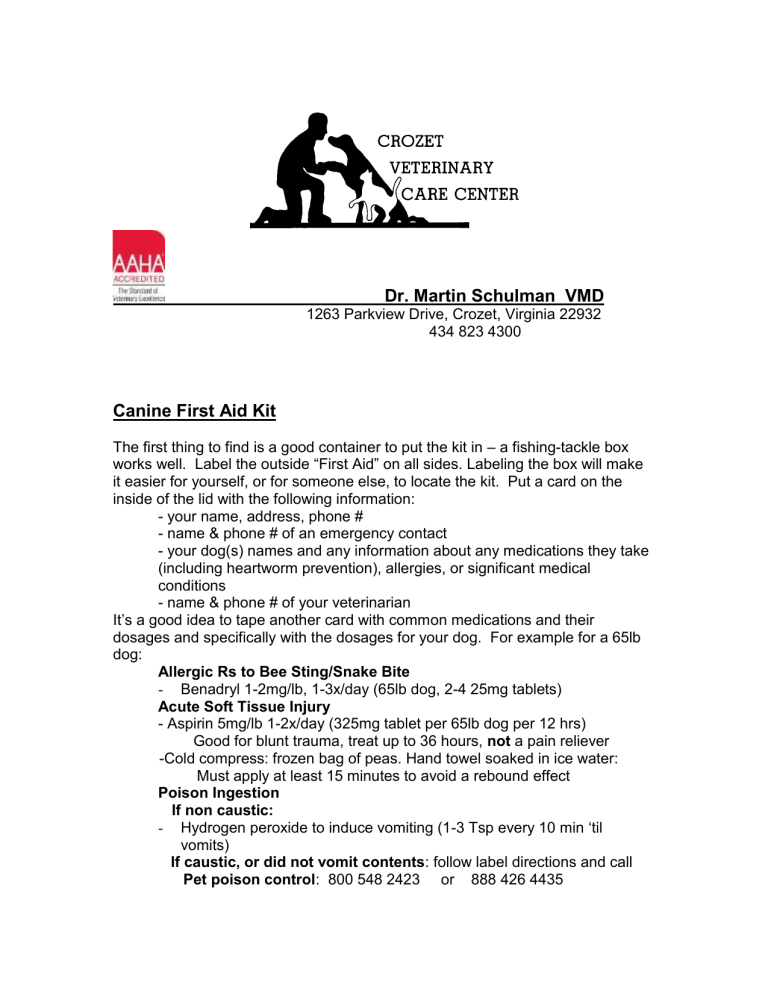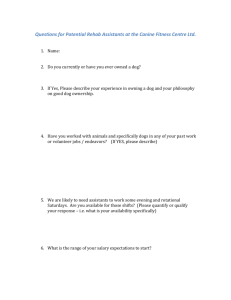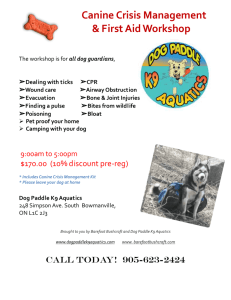Your Canine First Aid Kit

Dr. Martin Schulman VMD
1263 Parkview Drive, Crozet, Virginia 22932
434 823 4300
Canine First Aid Kit
The first thing to find is a good container to put the kit in – a fishing-tackle box works well.
Label the outside “First Aid” on all sides. Labeling the box will make it easier for yourself, or for someone else, to locate the kit. Put a card on the inside of the lid with the following information:
- your name, address, phone #
- name & phone # of an emergency contact
- your dog(s) names and any information about any medications they take
(including heartworm prevention), allergies, or significant medical conditions
- name & phone # of your veterinarian
It’s a good idea to tape another card with common medications and their dosages and specifically with the dosages for your dog. For example for a 65lb dog:
Allergic Rs to Bee Sting/Snake Bite
Benadryl 1-2mg/lb, 1-3x/day (65lb dog, 2-4 25mg tablets)
Acute Soft Tissue Injury
- Aspirin 5mg/lb 1-2x/day (325mg tablet per 65lb dog per 12 hrs)
Good for blunt trauma, treat up to 36 hours, not a pain reliever
-Cold compress: frozen bag of peas. Hand towel soaked in ice water:
Must apply at least 15 minutes to avoid a rebound effect
Poison Ingestion
If non caustic:
Hydrogen peroxide to induce vomiting (13 Tsp every 10 min ‘til vomits)
If caustic, or did not vomit contents : follow label directions and call
Pet poison control : 800 548 2423 or 888 426 4435
Occasional Vomiting GI Indiscretion wait 30 minutes after vomiting:
Pepto Bismol 1 tsp per 5lb per 6 hrs (3-4 TBSP per 65lb dog per 6 hrs)
Diarrhea see veterinarian if persists beyond 36 hours or if blood
Immodium 1mg per 15lbs 1-2 times daily
Constipation see veterinarian if persists beyond 36 hours or if blood
Mineral oil (as a laxative) 530ml per day … do not use long-term
-
And now for the kit itself:
- Blanket
- Gauze bandage
- Vet Wrap stretch only 50%
- First aid tape
- Gauze sponges
- Band-aids
- Saline solution
- Tweezers/forceps
- Blunt end scissors
- Razor blade (paper wrapped for protection)
- Matches
- Rectal thermometer
- Benadryl
- Buffered aspirin
-Thunder Shirt
- Antibiotic salve (Mucopuricin
- Hydrocortisone topical spray
- Safety pins (several sizes)
- Cotton swabs
- Eye rinsing solution
- Eye ointment w/no steroids
- Epsom salts - Vaseline
- Hydrogen peroxide (for cleansing wounds & treating
“hot spots”)
- Syringes 3cc or 6cc (for giving liquid medications orally)
- Iodine tablets (to treat water that might not be safe for consumption)
- Styptic powder (to stop bleeding, as with torn toenails)
- Iodine prep pads or flush (to clean wounds)
- Men’s cotton tube sock (can use to pin a lacerated ear to the head)
- Wire cutters
- Any specific medications your dog might need
DO NOT give any kind of ibuprofen (Nuprin, Motrin, Advil, etc) – it is toxic to dogs and fatal at low doses to cats.
LABEL clearly all medications and supplies, including name and expiration date.
Go through and discard any expired medications on a regular basis. It’s a good idea to check through and update your kit before doing any traveling.
Be sure to add to your kit when traveling:
- Food & water
- Bowl(s)
- Spare collar and leash
-
Keep a copy of your dog’s vaccination history, with a copy of their Rabies certificate, in your first aid kit.
Use Caution! Even small injuries can be painful – consider using a muzzle when working around an injured pet. Biting is a reflex when an animal is in pain. If you don’t have a muzzle available, you can use 1-2” rolled gauze. Wrap the gauze around the muzzle and tie behind the head halter-fashion. You can even use a tie or pantyhose in a pinch.
Can you tell the difference between an injury that you can treat yourself and see a vet when you return and a life-threatening situation that needs medical attention immediately?
Treat “in the field” and see your vet when you return:
- Superficial wounds such as lacerations of ear margins, paws, or tail tips
- Torn toenails
- Vomiting 1-2x in a day
– Withhold food for 12 hours & insure excellent drinking, in small amounts frequently-water, dilute broth, ice chips
- Diarrhea – Try feeding up to 1/3 of total food volume as rice, in 2-3 portions throughout the day. You can also try Immodium, as directed.
With more serious situations, you must take your pet immediately to your veterinarian:
Broken bones – blanket, keep warm, and limit activity, Wrap with plenty of c otton, then gauze, parallel sticks or rods for alignment, then vetwrap
- Snake bites – Elevate if possible, limit activity, blanket, Benadryl
- Ingestion of poisons, such as antifreeze or rat poison – even as little as one tablespoon of antifreeze can be fatal to a 60lb dog if not treated immediately.
- Recurrent/ongoing vomiting – If your dog vomits more than a few times in a day, seek medical advice.
- Recurrent/ongoing diarrhea – If diarrhea has continued for more than three days, or if your dog is not drinking appropriate amounts for his/her weight (greater than or equal to 1oz per pound per day), see your vet
- Gastric torsion (bloating followed by twisting of the stomach wall)
–
Torsion is fatal if left untreated. Symptoms may include loss of appetite, salivation, vomiting, and abdominal enlargement. Large breeds and sporting breeds are most at risk. You can help prevent gastric torsion by avoiding exercising your dog for an hour before and two hours after eating, avoid full sun on hot days, and by feeding two highly digestible meals a day. Surgical gastropexy at time of spay/neuter in at risk breeds.
If in doubt, call your vet – catching and treating problems early can make all the difference!








